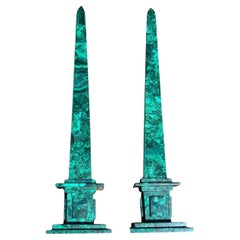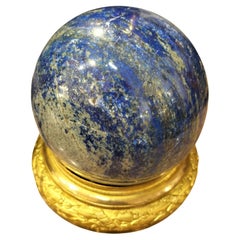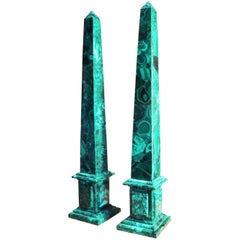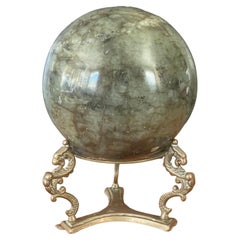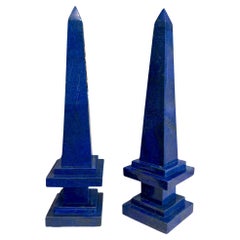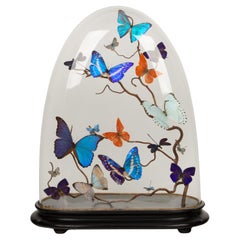Napoleon III Natural Specimens
Under Napoleon III’s rule, Paris underwent a great rebuilding overseen by Baron Georges-Eugène Haussmann, which created grand avenues and lavish landmarks like the Paris Opera. Antique Napoleon III–style furniture was flamboyant and eclectic. It was also known as Second Empire style since it followed and referenced the Empire style of his uncle Napoleon I.
Developing from 1852–70, Napoleon III furniture was plush and ornate, matching the fashion for masked balls and socializing in salons. It borrowed freely from earlier French styles including Louis XIV, Louis XV and Louis XVI as well as aesthetics from around the world, from antiquity to Asian art. As writer Gustave Claudin remarked in 1867, the country’s architects worked in “a style which one would be tempted to call neo-Greco-Gothico-Pompadour-Pompeian.”
Napoleon III chairs were completely covered with velvet and lined with tassels; pouf footstools invited people to put up their feet. Sofas were upholstered with tapestries, and beds were adorned with gilt bronze and theatrical canopies. The addition of conservatories to homes led to new indoor-outdoor furniture, while the spirit of hygiene promoted by Baron Haussmann inspired bright, floral motifs.
Although the most ostentatious designs were for the elite, as seen in the Napoleon III apartments preserved in the Louvre, where red velvet, gilding and chandeliers create a cacophony of luxury, these trends influenced homes across classes as manufacturing made design increasingly accessible. Papier-mâché furniture allowed for elaborate shapes that would have been difficult to carve in wood. The malleable material was painted with chinoiserie patterns and decorative designs. It was mass-produced by factories such as Jennens and Bettridge with varnishing and mother-of-pearl inlays creating an effect reminiscent of Asian lacquer. (Surfaces that had been “japanned” — a specialty of Jennens and Bettridge — were intended to resemble lacquer work that was created in East Asia.)
Find a collection of antique Napoleon III decorative objects, tables, seating and other furniture on 1stDibs.
20th Century Russian Napoleon III Natural Specimens
Malachite
20th Century Afghan Napoleon III Natural Specimens
Lapis Lazuli, Bronze
20th Century Russian Napoleon III Natural Specimens
Stone, Malachite
Late 20th Century North American Napoleon III Natural Specimens
Marble, Bronze
Late 19th Century French Antique Napoleon III Natural Specimens
Marble, Bronze
21st Century and Contemporary Brazilian Napoleon III Natural Specimens
Lapis Lazuli, Quartz
20th Century Napoleon III Natural Specimens
Malachite
2010s Afghan Napoleon III Natural Specimens
Lapis Lazuli
21st Century and Contemporary Afghan Napoleon III Natural Specimens
Lapis Lazuli
Late 19th Century Italian Antique Napoleon III Natural Specimens
Lapis Lazuli, Bronze
15th Century and Earlier Afghan Antique Napoleon III Natural Specimens
Crystal, Lapis Lazuli, Rock Crystal
Mid-20th Century Unknown Napoleon III Natural Specimens
Malachite
20th Century European Napoleon III Natural Specimens
Malachite, Onyx
Early 20th Century French Napoleon III Natural Specimens
Bakelite
Mid-19th Century Afghan Antique Napoleon III Natural Specimens
Lapis Lazuli
Mid-19th Century American Antique Napoleon III Natural Specimens
Glass, Blown Glass, Wood
19th Century German Antique Napoleon III Natural Specimens
Bronze
21st Century and Contemporary French Napoleon III Natural Specimens
Metal
21st Century and Contemporary American Napoleon III Natural Specimens
Coral
2010s French Napoleon III Natural Specimens
Copper, Brass
2010s French Napoleon III Natural Specimens
Copper, Brass
2010s French Napoleon III Natural Specimens
Copper, Brass
21st Century and Contemporary French Napoleon III Natural Specimens
Metal
21st Century and Contemporary French Napoleon III Natural Specimens
Metal
15th Century and Earlier Peruvian Antique Napoleon III Natural Specimens
Quartz, Pyrite, Metal
